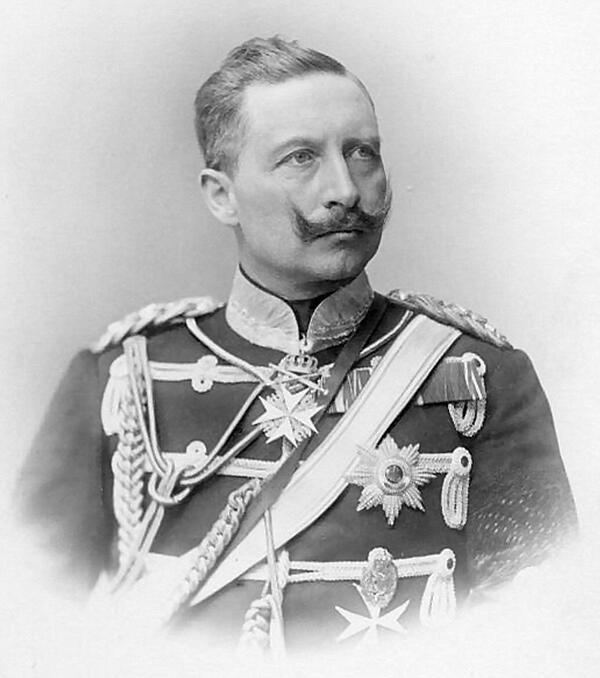Wilhelm II
Kaiser Wilhelm II was German emperor and king of Prussia during World War One. His push for aggressive German colonial expansion alienated the British and was one cause of World War One. However, Wilhelm’s authority was limited - he was often excluded from military decisions and after the war he abdicated and lived in exile.
Born on 27 January 1859, Wilhelm mastered horse riding at a young age and was fascinated with the military, including the military uniforms of which he owned many.
Wilhelm’s antagonism towards Britain in the Boer War and later in World War One is at odds with his lineage. His mother, Vicky, was the Princess Royal of Great Britain and the eldest child of Queen Victoria. Vicky was intelligent, learning to read and write before the age of five. She married Prince Frederick William of Prussia at the age of 17, to shouts of "God save the Prince and Bride! God keep their lands allied!" from the British public.
Frederick was dying of cancer when he ascended the throne in 1888. After a reign of only 98 days, Wilhelm I succeeded him. Frederick had cultivated a belief in his son that a Prussian attitude was superior to any other; this included the Prussian values and of courage, self-sacrifice and service to the military.

The historian Michael Balfour argues that Wilhelm’s success was limited by an over-reliance on his ministers. He believes that the Triple Entente between Britain, France and Russia was a result of the threatening stance of German ministers.
The one aspect of policy that Wilhelm was certain about was the importance of naval expansion. Wilhelm’s knew that if Germany wanted to gain international respect, she needed a modern navy like Britain’s. However, he underestimated the anger this would provoke in Britain.
To what extent Wilhelm played a part in the start of World War One will always be open to debate and neither he nor Germany was the sole cause of the war. Wilhelm could not have predicted the devastation of World War One.
Wilhelm II was also greatly influenced by German statesman, Otto Bismarck, who tried to ‘Prussianise’ German society following the unification. His success is debatable but he did define ‘good’ German values. When Wilhelm became king of Germany he utilised these values, hoping to epitomise these values of discipline and courage.
Wilhelm II was the product of two different cultures. Although he respected Great Britain, his militaristic values were at odds with those of the British. As German Emperor he felt that the country expected the Prussian-version of Wilhelm to be prominent and as emperor he lived up to it.
Wilhelm inherited a rapidly changing Germany. Industrialisation had created a new class system. The trade unions of the working class were incomprehensible to Wilhelm. He couldn’t comprehend why people would put themselves before their country.
The Kaiser was given extensive powers by the 1871 German Constitution. Now, his was the only signature needed to sign decrees. This meant that Wilhelm could sign bills without the Chancellor’s approval. The British presented Wilhelm II as power hungry, believing he made big decisions just because he could.
MLA Citation/Reference
"Wilhelm II". HistoryLearning.com. 2025. Web.
